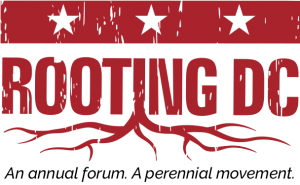It may seem impossible to add just one more topic into medical education, but many health professionals and the public alike are calling for better incorporating nutrition into medical education and training to address the problems of food insecurity, obesity, and nutrition-related diseases that simultaneously contribute to nearly $3.3 trillion in total US healthcare-related costs. Compared to most other high-income countries, we have the highest rate of adult obesity, the lowest life expectancy, and the highest infant mortality. In DC, the rate of obesity is below the national average but still very high (at 24.7%) and the average life expectancy is 1.5 years shorter, indicating we have a long way to go.
Why Do Doctors Need Nutrition?
While registered dietitians (RDs) ultimately hold this expertise, doctors and other allied health professionals need at least a basic understanding to be able to answer patients’ questions, address patients’ nutritional needs when and where RDs are not available, and know when to refer patients to RDs for counseling or a more acute intervention in an inpatient setting.
Currently, only 29% of American medical students receive the National Academies of Sciences’ recommended minimum 25 hours of nutrition education. Twenty-nine percent of schools require what they consider to be a full nutrition course, but this typically translates to just a minimum of five hours during the entire program. These numbers have declined in recent years while rates of diabetes, heart and kidney transplants, and many other conditions often attributed to poor diet have continued to rise.
And yet, a 2008 survey showed that more than 80% of physicians believed they lack enough training in nutrition to be able to discuss nutrition with patients. Additionally, an external survey about nutritional knowledge conducted of medical interns at New York University School of Medicine showed an average score of just 66%. And based on a 2017 survey of cardiologists—who so often treat and manage lifestyle-related diseases—90% reported receiving no or minimal nutrition education during fellowship training. Lacking both knowledge of the field and the skills required to educate and counsel patients, these providers are inadequately prepared to efficiently address a significant proportion of the current burden of poor health in the US.
Progress in Educational Policy
On a national level, the Harvard Food Law and Policy Clinic (FLPC) recently published a report about how policies can be used to improve the doctors’ awareness and interventions focused on patients’ nutritional needs. In fact, Congressman McGovern (MA-D) sponsored a briefing for an audience of practitioners, lawyers, and concerned citizens last month (which I attended). The report provides recommendations at both national and local levels to improve patient care and outcomes and reduce healthcare costs by better addressing this issue too often thought to be irrelevant to doctors’ practice.
The District of Columbia has been a pioneer in this field and our own Councilmembers Cheh, T. White, Bonds, and Silverman introduced a bill entitled, “Continuing Nutrition Education Amendment Act of 2019,” B23-0360, in June 2019. This bill would help to validate nutrition as a component of comprehensive healthcare by mandating only two units of continuing professional education (CPEs) in nutrition education for physicians and various other healthcare professionals. While it wouldn’t change education received during schooling, it would require the education on an ongoing basis, ensuring they are learning and then sharing with patients the latest evidence-based information.
I actually had the opportunity to speak along with the DC Metro Academy of Nutrition and Dietetics (DCMAND) representatives in favor of this with several staffers in city council over the summer, while advocating for several nutrition-focused bills under consideration. The Committee on Health held a public hearing on this and other healthcare-related bills on November 13, 2019, receiving support from the FLPC as well as the local well-known Physicians Committee for Responsible Medicine and opposition from the DC Board of Medicine and Board of Nursing. DCMAND again submitted written testimony in support. The bill is now under council review.
Meanwhile, some medical schools and healthcare institutions are starting to catch on. In DC, the George Washington School of Medicine and Health Sciences has taught a full elective in culinary medicine in both semesters for the last several years. This innovative format enables students to learn about nutrition using a kitchen as a lab, helping them to better apply the knowledge in their own lives and better translate it to patients. The Population Health Scholar Track at Georgetown University Medical School has begun experimenting with a culinary medicine elective this year (and I had the pleasure of participating as a guest lecturer), based on the initiative of a few passionate students and supportive professors. Nationwide, schools such as UCLA’s Pediatric Residency Program and Stanford Medical Center have also been pioneers in launching new courses teaching nutrition science, cooking, and basic counseling.
I look forward to hearing how this local bill advances, improving access for patients to sound nutrition advice, and how it will inspire states throughout the country to follow with their own similar legislation. It is a critical step to ensure we equip health professionals with the knowledge needed to treat—or better yet, prevent—the most pressing health conditions burdening America today.
Author Bio: Christina Badaracco
I am a registered dietitian seeking to improve access to healthy and sustainable food and educate Americans about the connections between food and health. I currently work in healthcare consulting, where I focus on healthcare transformation and elevating the role of nutrition services in healthcare. I also work part-time as a project coordinator for the Teaching Kitchen Collaborative. Learn more about me and my work at christinabadaracco.com


